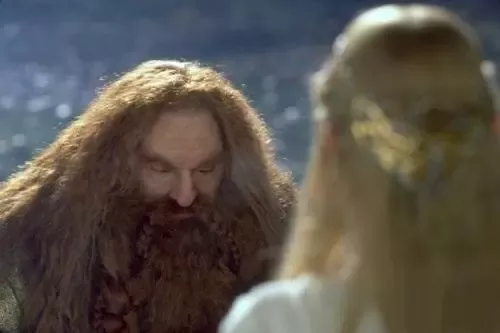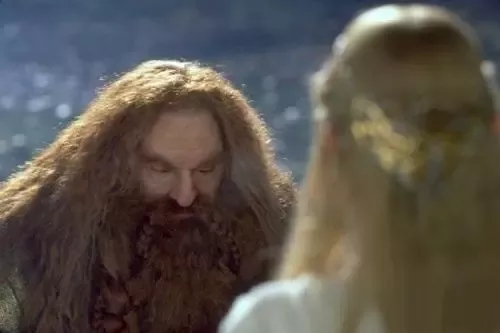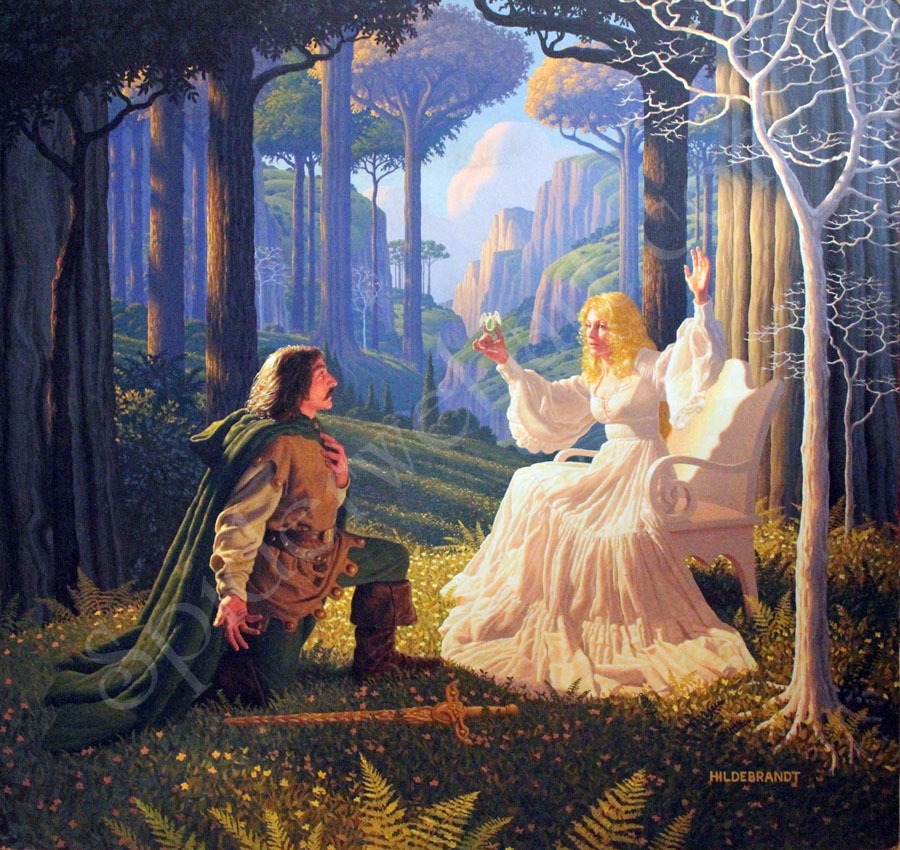The Two Towers by J.R.R Tolkien (Harper Collins 1991, 2007) pp. 874-878
Faramir is a warrior. When Éowyn first meets him in the Houses of Healing in Minas Tirith after the Battle of the Pelennor Fields she assesses him shrewdly as a warrior herself, “bred among men of war, that here was one that no Rider of the Mark could outmatch in battle”.

Anke Eissman shows us Faramir the man of war who longs for peace on his first meeting with Éowyn who is a warrior who does not yet know that there is contentment to be found in peace.
But Faramir does not love war or the way of the warrior. After the War of the Ring and after he marries Éowyn of Rohan he will devote his life to the arts of peace. Together with his bride he will restore the land of Ithilien to its former beauty. Later in his encounter with Frodo and Sam Faramir will say of the Shire, “Your land must be a place of peace and content, and there must gardeners be in high honour”.
Faramir would be a gardener himself, not an industrial scale food producer, one who reduces the land to compliant submission with pesticides and chemical fertilisers, but one who would allow the land to find its true wildness in which the growing of food would take its natural place. In essence he would be one who would re-unite the Ents and the Entwives, if that were possible, working as a sub-creator to make a land where both could live at peace with one another. When Treebeard met Merry and Pippin and learnt of the Shire he commented that it was a land that the Entwives would love. The Ents would love the Old Forest, a land in which the hobbits felt themselves to be alien. Is there a land where both could live together in harmony?

“Come back to me and say my land is best.” The Ents and the Entwives as depicted by Luca Bonatti.
But here we must return to the reality of war. Faramir is now a warrior by necessity. Mordor has already seized control of Ithilien and Faramir and his men are operating behind enemy lines. And they would take the rest of Gondor too and then land by land the rest of Middle-earth also. Mordor is an empire that would make the whole earth its slave, that would make it like Mordor itself. So, as Faramir puts it himself, “War must be, while we defend our lives against a destroyer who would devour all”.
So Tolkien was not a pacifist in an absolute sense, one who regards war as unjustified in all cases, even that in which an enslaving enemy seeks to devour a peaceful land. But neither Tolkien, nor Faramir, love war for its own sake.
“I do not love the bright sword for its sharpness, nor the arrow for its swiftness, nor the warrior for his glory. I love only that which they defend: the city of the Men of Númenor; and I would have her loved for her memory, her ancientry, her beauty, and her present wisdom. Not feared, save as men may fear the dignity of a man, old and wise.”
This is a theme that runs throughout all Tolkien’s works. That the arts of peace are superior to the arts of war. We remember the last words that Thorin Oakenshield said to Bilbo as he lay dying after the Battle of the Five Armies. “If more of us valued food and cheer and song above hoarded gold it would be a merrier world.” And yet, as Aragorn says at the Council of Elrond, the northern lands of which the Shire is one would have known little of peace unless they had been defended. “What roads would any dare to tread, what safety would there be in quiet lands, or in the homes of simple men at night, if the Dúnedain were asleep, or were all gone into the grave?”

The death of Thorin Oakenshield by Abe Papakien.
So Tolkien never quite resolves the question of how much must a land and its people be prepared to defend themselves against potential threat, and perhaps it can never be fully resolved. So Faramir must be a warrior by necessity even though he longs to practice the arts of peace. And perhaps this is where we must leave the debate for now. Perhaps Faramir gives us a sense of how to live with this tension. He is trained for war and yet longs for peace, He is unyielding in war as he showed in the battle against the Haradrim in which we first met him and yet he is gentle in all his dealings with the hobbits who are now his prisoners. Such a tension requires a hard practice and discipline. The fruit of that discipline is the man who now speaks his heart to Frodo, one of the greatest of all Tolkien’s creations.





















